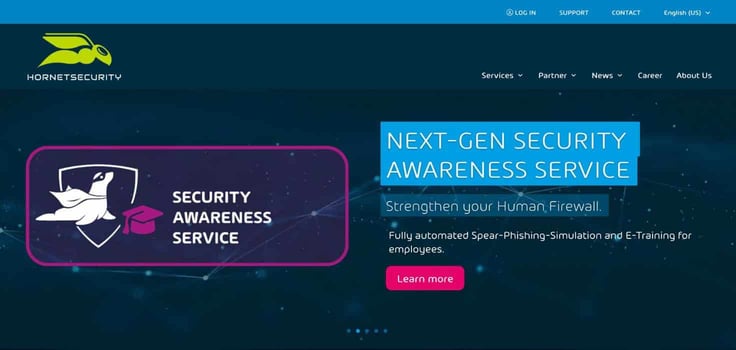
TL; DR: Microsoft 365 is one of the most popular email and productivity platforms in the world. It allows businesses to get collaboration tools, email, and file-sharing capabilities all in one place. But with cybercriminals increasingly targeting collaboration tools, companies must secure these Microsoft 365 operations to reduce the risk of an attack. Hornetsecurity provides a comprehensive security suite for all your Microsoft 365 needs. The software company covers everything from threat detection, email validation, and security awareness to help users protect their data from hackers. We spoke with Andy Syrewicze, Technical Evangelist at Hornetsecurity, about the platform and its benefits.
Cyberattacks aren’t a matter of if but when for businesses. Since the COVID-19 pandemic, cyber threats have increased each year. And bad actors no longer aim these attacks primarily at enterprises. It doesn’t matter whether you own a small business or run a conglomerate. Any business of any size with the ability to pay ransom can become a target for bad actors to aim their darts.
In 2022, the number of reported global attacks rose by 38% compared to 2021. According to Security Magazine, this rise can be attributed to a growing number of agile hackers targeting business collaboration tools, such as Slack, Teams, and Google Drive. The pandemic prompted many businesses to adopt these tools to enable remote work, and teams have been using them since. But they can pose a major security risk.
It’s not necessarily the software’s fault. Instead, hackers use these tools as bait to trick humans into falling into their traps. They may send a message asking for a user to change their password or update their multifactor authentication, but the embedded link is actually a gateway to an attack. So basically, bad actors depend on these human errors to succeed.

“Increasingly, we are seeing that the human is the vector of the attack. We see cases like C-suite fraud-style emails and social engineering emails with the intent to get the malware on target users’ endpoints. They’re targeting the user now more than ever before,” said Andy Syrewicze, Technical Evangelist at Hornetsecurity.
Hornetsecurity provides a comprehensive software suite of security solutions to help protect Microsoft 365 users from threats. Its software is cloud-based and simple to install, making it ideal for businesses of all sizes. By leveraging Hornetsecurity, teams can secure their collaboration and email operations with an easy-to-use solution.
Raising Security Awareness for Every User
Founded in 2007, Hornetsecurity helps companies protect their data by safeguarding emails, documents, and files with its threat protection, backup recovery, and other security technologies. More than 50,000 organizations trust Hornetsecurity to secure their Microsoft 365 operations.
“Microsoft 365 has been growing by leaps and bounds year over year. So clearly, it’s where businesses are going for productivity. So with that in mind, we’ve decided to provide the most comprehensive layer of security for 365,” said Andy.
Hornetsecurity provides protection in multiple ways. Its solution covers everything from governance and compliance to backup recovery and malware protection. That way, teams won’t have to integrate other tools to manage their email and data security. Another unique highlight of the Hornetsecurity platform is its security awareness services.
“Training the user with security awareness services is as equally important as the email security component. That gives you a well-rounded defense mechanism against modern-day threats,” said Andy.

Educating users on the best security practices is an essential step in securing infrastructure, especially since so many attacks are user-focused. According to the World Economic Forum, 95% of cybersecurity incidents are caused by human error. This can be seen in the example of multifactor authentication. Completing multifactor authentication has become such a habitual task for teams that many users don’t realize when they’re clicking on false links.
“We’ve inadvertently trained users to press ‘approve’ or ‘allow’ to get their day-to-day work done. And it has contributed to this clicky behavior that we see from end users today, which doesn’t help security engineers,” said Andy.
Hornetsecurity’s security awareness services use AI to help sensitize and protect users from cyberthreats to reduce the potential of successful breaches. “We’re simulating the threats and sending it to the end user. So we use AI to create some of those phishing simulation emails that ultimately end up in end users’ inboxes to help train them on spotting those threats,” said Andy.
Using AI to Detect and Combat New Threats
Andy said news media in the security space don’t often focus on AI’s benefits for defensive security providers. But this unspoken treasure has helped Hornetsecurity amp up its defense in more ways than one. We’ve already touched on how Hornetsecurity leverages AI for its security awareness services. But its latest AI-powered invention helps users prevent data leaks.
“We’ve always been focused on keeping the bad stuff out and haven’t worried much about the other direction. But a lot of times, people go on autopilot, add recipients, and don’t think about where that email goes. Many cases exist where you’ve got potential data leaks from that behavior,” said Andy.
What happened to the Pentagon can serve as an example. Over the past decade, millions of emails intended for the Pentagon were accidentally sent to email accounts of Mali residents. How did this happen? Well, the repeated typo occurred because of the similarity in domain names. The Pentagon’s domain extension is .MIL while Mali’s domain country code is .ML.
“That’s where a solution like our AI Recipient Validation can raise the flag to the end user attempting to send that email and ask them if they’re sure this needs to go to a .ML domain or a .MIL one,” said Andy.
In addition to its AI-based email validator, Hornetsecurity also offers an Advanced Threat Protection engine for email security. It uses AI to detect threats or vulnerabilities that traditional signature and hash-based detection methods can’t. The engine can spot behavioral deception techniques and other social engineering tactics to combat business email attacks.
“Our security lab is always on the lookout for the next style of attack. So we’re looking to see where we can further enable our platform with AI technologies to combat that rise of AI-enabled attacks as well,” said Andy.
The Latest: A New Security Suite and Immutable Cloud Storage
Hornetsecurity recently added a new suite to its 365 Total Protection solution. The company originally had three suites: one with the basics, a second with Advanced Threat Protection, and a third with Microsoft 365 backup and endpoint backup components.
“Plan four adds in governance and compliance in addition to email security, backups, and security awareness services. You also get my favorite solution in the stack, the 365 Permission Manager,” said Andy.
The 365 Permission Manager allows users to monitor and manage Microsoft 365 permissions. Similar to how teams can run the risk of data leaks through email, they can also do the same in file sharing. So the permission manager provides a single display of who has access and what was shared, so administrators can track the security of their data workflow.
The Hornetsecurity team also added a new feature to its virtual machine backup solution. This feature is called Immutable Cloud Storage. It allows companies to protect their backup data in the event of a ransomware attack.
“Immutable means nobody can touch it after it’s written. Nobody can change those blocks, not even a compromised administrator account. So that way, customer backups are always available and ready to go in the event of a ransomware attack,” said Andy.


